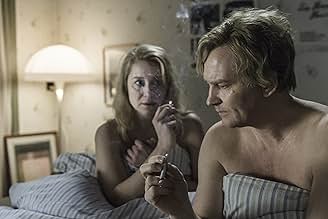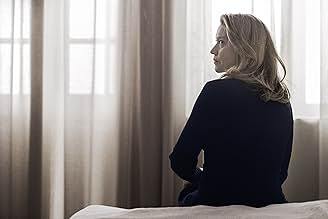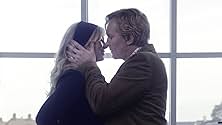NOTE IMDb
6,4/10
8,5 k
MA NOTE
Une histoire de confrontation entre désirs personnels, solidarité et tolérance dans une commune danoise dans les années 1970.Une histoire de confrontation entre désirs personnels, solidarité et tolérance dans une commune danoise dans les années 1970.Une histoire de confrontation entre désirs personnels, solidarité et tolérance dans une commune danoise dans les années 1970.
- Réalisation
- Scénario
- Casting principal
- Récompenses
- 6 victoires et 21 nominations au total
Avis à la une
This is quite a slow burner, plot pace wise. Its mostly about family dynamics and trust. It took a while for me to feel especially interested in the characters but I thought it was somewhat of a powerful watch by the time it headed towards the end and I would say it may make you think.
If your not keen on character focussed dramas then this won't be for you. Also of course you likely have to rely on the subtitles, as its in Danish, although I was pleased to see that the subtitles were quite large in terms of text size, compared to other films with smaller subtitles, so if anything it was slightly less of an issue than it might have been. I felt sorry for the wife Anna and I did find myself wondering what might happen next, as things moved on plot wise but it is, as I say, a relatively slow burner, so don't expect fast paced action or anything of that sort. Its a reasonably intriguing watch and overall I suppose I'd say its a good watch, hence my rating.
If your not keen on character focussed dramas then this won't be for you. Also of course you likely have to rely on the subtitles, as its in Danish, although I was pleased to see that the subtitles were quite large in terms of text size, compared to other films with smaller subtitles, so if anything it was slightly less of an issue than it might have been. I felt sorry for the wife Anna and I did find myself wondering what might happen next, as things moved on plot wise but it is, as I say, a relatively slow burner, so don't expect fast paced action or anything of that sort. Its a reasonably intriguing watch and overall I suppose I'd say its a good watch, hence my rating.
"The Commune" at the center of Thomas Vinterberg's film isn't typical of the communes I knew back in the day. For a start, the members of this one are reasonably well off and are mostly middle-aged and, of course, they bring to this 'living together' thing all the baggage you would expect. Things come to a head when commune founder Erik, (Ulrich Thomsen), falls for one of his students and moves her in leading his wife Anna, (Trine Dyrholm), to have a nervous breakdown.
Vinterberg's film began life as a play and it's certainly very theatrical but despite the emotional conflicts at the film's heart, it's also fairly conventional with everyone other than Erik and Anna fading very much into the background. You never get to know any of them. Subplots come and go and it just trudges on. On the plus side, it's very well acted particularly by Dyrholm who won the Best Actress prize at Berlin; she's the only one you actually care about. It might have worked better on stage where at least you could feel 'in the same place' as these commune-dwellers. On screen, it just feels like another piece of Vinterberg navel-gazing.
Vinterberg's film began life as a play and it's certainly very theatrical but despite the emotional conflicts at the film's heart, it's also fairly conventional with everyone other than Erik and Anna fading very much into the background. You never get to know any of them. Subplots come and go and it just trudges on. On the plus side, it's very well acted particularly by Dyrholm who won the Best Actress prize at Berlin; she's the only one you actually care about. It might have worked better on stage where at least you could feel 'in the same place' as these commune-dwellers. On screen, it just feels like another piece of Vinterberg navel-gazing.
The emotional upheaval of a tightly-knit community has become Thomas Vinterberg's trademark as a film maker. He explored this theme with great success in 'Festen' and in 'Jagten', and now he does it in 'Kollektivet'. This time, the community is a group of people living together in a large house, a way of living that was trendy in the sixties and seventies. The group consists of friends and acquaintances of architect Erik and journalist Anna. Together, they fill up the huge villa he inherited from his parents. Anna thinks this social experiment can add some spice into her life. After all, she has been married to the same man and doing the same job for fifteen years.
But the cozy atmosphere of having meals and drinking beer together with a group of friends, turns sour when Erik introduces someone new into the group: his girlfriend, a young and pretty student. His wife Anna agrees with this arrangement, and in fact proposes it, hoping to keep Erik close to her. But predictably, the whole experiment ends in tears, fights and bitter reproaches.
Vinterberg's film has a different tone of voice than 'Festen' and 'Jagten'. It is a bit more lighthearted, and less harsh. He not only analyzes the emotional feelings of the characters, but also shows how society has changed in the last forty years. What struck me, was how easily Erik gets away with abject male-centred behaviour. He cheats on his wife practically in front of her eyes, and seems to have hardly any emotional connection to her or their daughter. In the end, it is his girlfriend who has to point out to him that his wife is having an emotional breakdown. But even then, he doesn't see the damage he has created. Instead, he complains that all these 'women issues' distract him from his work. Nowadays, a man would get a slap in the face after saying something like that.
The seventies-atmosphere adds an extra dimension to the film, and the period setting makes it an easier viewing experience than 'Jagten' or 'Festen'. At the same time, it is also less intense. It's nice to watch, but doesn't make you shift uneasily in your chair.
But the cozy atmosphere of having meals and drinking beer together with a group of friends, turns sour when Erik introduces someone new into the group: his girlfriend, a young and pretty student. His wife Anna agrees with this arrangement, and in fact proposes it, hoping to keep Erik close to her. But predictably, the whole experiment ends in tears, fights and bitter reproaches.
Vinterberg's film has a different tone of voice than 'Festen' and 'Jagten'. It is a bit more lighthearted, and less harsh. He not only analyzes the emotional feelings of the characters, but also shows how society has changed in the last forty years. What struck me, was how easily Erik gets away with abject male-centred behaviour. He cheats on his wife practically in front of her eyes, and seems to have hardly any emotional connection to her or their daughter. In the end, it is his girlfriend who has to point out to him that his wife is having an emotional breakdown. But even then, he doesn't see the damage he has created. Instead, he complains that all these 'women issues' distract him from his work. Nowadays, a man would get a slap in the face after saying something like that.
The seventies-atmosphere adds an extra dimension to the film, and the period setting makes it an easier viewing experience than 'Jagten' or 'Festen'. At the same time, it is also less intense. It's nice to watch, but doesn't make you shift uneasily in your chair.
Vinterberg, understandably having grown up in a commune, doesn't properly establish the hippy commune lifestyle. Probably because to him, that's just what he grew up with. He assumes you already know (and I do) but most people don't (or haven't thought about it) so the film feels severely lacking in world building. If this movie were an essay the first paragraph with the hypothesis is missing. Tell us a little bit about the ideology behind the choice in lifestyle; you did it beautifully did with Druk! Without it, the dramatic, emotional and ideological arithmetic doesn't quite add up. Have Ole tells us a bit about his left wing literature! Not to mention, Vinterberg shares nothing of the drug culture that the hippy lifestyle so adamantly relies on. Squash any human instinct/desire with a physical simulation; that's the hippy way. Feel unhappy: drink. You don't get that spark from learning something new? Just take a smoke and you'll get that spark relearning things you already know. Everything is material for the hippy, everything superficial. Real emotions always denied because we have pills for that! This film severely lacked a proper set up of that world in the first half.
That being said, this film develops into a deeply pertinent and important message. He perfectly diagnoses the problems with a hippy approach to a family structure. And I know this because my own family was a victim of this way of life. The mom in the film is my mom. The dad is my dad. The people in the film are from 70s Denmark, and my parents are from 90s LA. And while we live miles apart, the way of thinking leads to the same outcomes, and I have to repeat: Vinterberg perfectly diagnoses the problem with this type of thinking. While the woman may be the one suggesting a free love lifestyle, it's ultimately the women who will always suffer. The patriarch is to blame because he is the leader, whether or not he rhetorically offloads his duty to others.
The institution of marriage protects women, as their prospects of love virtually become null and void once they become old and ugly. The man however can remarry. This is why marriage exists. My parents were stupid enough to never make this observation and like in the movie, my mom ended up hooked on pills and alcohol while my father ran off with his tight new muse. And if you think the corporate world has any interest in supporting old women, think again.
That being said, this film develops into a deeply pertinent and important message. He perfectly diagnoses the problems with a hippy approach to a family structure. And I know this because my own family was a victim of this way of life. The mom in the film is my mom. The dad is my dad. The people in the film are from 70s Denmark, and my parents are from 90s LA. And while we live miles apart, the way of thinking leads to the same outcomes, and I have to repeat: Vinterberg perfectly diagnoses the problem with this type of thinking. While the woman may be the one suggesting a free love lifestyle, it's ultimately the women who will always suffer. The patriarch is to blame because he is the leader, whether or not he rhetorically offloads his duty to others.
The institution of marriage protects women, as their prospects of love virtually become null and void once they become old and ugly. The man however can remarry. This is why marriage exists. My parents were stupid enough to never make this observation and like in the movie, my mom ended up hooked on pills and alcohol while my father ran off with his tight new muse. And if you think the corporate world has any interest in supporting old women, think again.
A middle class Danish couple find that they have inherited a rather grand house on the death of Erik's father. It is going to be too big for them and their only daughter and more over too hard to finance and so Anna suggests they invite a few others to live with them and for a 'Kollektivet' or as we would call it a commune.
They waste little to no time in getting an assorted array of waifs and not so strays and soon fine that communal living bring challenges and opportunities in equal measure. Not all of them are going to be easy to grasp and the tensions, that go hand in hand with any social experiment, waste no time in pushing their way to the fore.
Now I really liked this, I loved the idea of a commune having spent time in one in the eighties (when they were a bit passé to be honest) and the themes are explored here but also the lives of the main characters are mostly to the fore. This is Anna played brilliantly by Trine Dryholm – 'The Legacy' and her husband Erik (Ulrich Thomsen – 'The Blacklist') and their young daughter who is growing up much too quickly. His is from director Thomas Vinterberg who brought us 'The Hunt' in 2012 and 'The Celebration' in 1998 and I think he has an eye for style but sometimes struggles to engage, but here I think he has melded all parts of the art very well together to bring a very entertaining watch – recommended.
They waste little to no time in getting an assorted array of waifs and not so strays and soon fine that communal living bring challenges and opportunities in equal measure. Not all of them are going to be easy to grasp and the tensions, that go hand in hand with any social experiment, waste no time in pushing their way to the fore.
Now I really liked this, I loved the idea of a commune having spent time in one in the eighties (when they were a bit passé to be honest) and the themes are explored here but also the lives of the main characters are mostly to the fore. This is Anna played brilliantly by Trine Dryholm – 'The Legacy' and her husband Erik (Ulrich Thomsen – 'The Blacklist') and their young daughter who is growing up much too quickly. His is from director Thomas Vinterberg who brought us 'The Hunt' in 2012 and 'The Celebration' in 1998 and I think he has an eye for style but sometimes struggles to engage, but here I think he has melded all parts of the art very well together to bring a very entertaining watch – recommended.
Le saviez-vous
- AnecdotesThe film is based on Thomas Vinterberg's play of the same name, which is inspired by his colourful childhood in an academic commune north of Copenhagen.
- GaffesThe signs on the bus stops were not introduced until the late 80's or 90's.
Meilleurs choix
Connectez-vous pour évaluer et suivre la liste de favoris afin de recevoir des recommandations personnalisées
- How long is The Commune?Alimenté par Alexa
Détails
Box-office
- Montant brut aux États-Unis et au Canada
- 38 737 $US
- Week-end de sortie aux États-Unis et au Canada
- 9 249 $US
- 21 mai 2017
- Montant brut mondial
- 4 410 339 $US
- Durée1 heure 51 minutes
- Couleur
- Mixage
- Rapport de forme
- 2.35 : 1
Contribuer à cette page
Suggérer une modification ou ajouter du contenu manquant

Lacune principale
By what name was La Communauté (2016) officially released in India in English?
Répondre




























